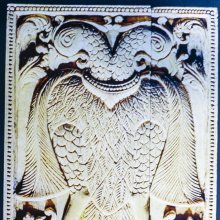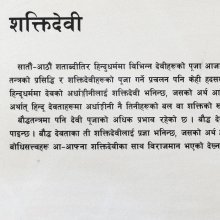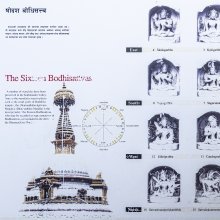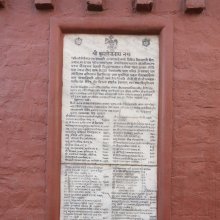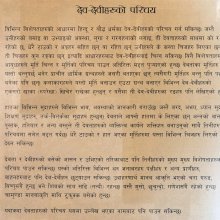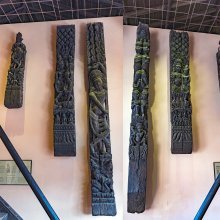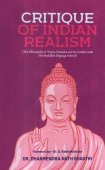Catta, Cāttā: 11 definitions
Introduction:
Catta means something in Hinduism, Sanskrit, Buddhism, Pali, the history of ancient India, Marathi, Jainism, Prakrit, biology, Tamil. If you want to know the exact meaning, history, etymology or English translation of this term then check out the descriptions on this page. Add your comment or reference to a book if you want to contribute to this summary article.
Alternative spellings of this word include Chatta.
Images (photo gallery)
(+1 more images available)
India history and geography
Source: Cologne Digital Sanskrit Dictionaries: Indian Epigraphical GlossaryCaṭṭa.—(EI 25), Tamil corruption of Sanskrit Chātra; a student. (IE 8-3), cf. a-caṭṭa-bhaṭṭa-praveśa (IE 8-5); same as Cāṭa of earlier records. Note: caṭṭa is defined in the “Indian epigraphical glossary” as it can be found on ancient inscriptions commonly written in Sanskrit, Prakrit or Dravidian languages.

The history of India traces the identification of countries, villages, towns and other regions of India, as well as mythology, zoology, royal dynasties, rulers, tribes, local festivities and traditions and regional languages. Ancient India enjoyed religious freedom and encourages the path of Dharma, a concept common to Buddhism, Hinduism, and Jainism.
Biology (plants and animals)
Source: Google Books: CRC World Dictionary (Regional names)Catta in India is the name of a plant defined with Acacia catechu in various botanical sources. This page contains potential references in Ayurveda, modern medicine, and other folk traditions or local practices It has the synonym Acacia polyacantha Willd. (among others).
Example references for further research on medicinal uses or toxicity (see latin names for full list):
· London Journal of Botany (1842)
· Species Plantarum.
· Journal of Economic and Taxonomic Botany (1996)
· Plant-Book
· Journal of Economic and Taxonomic Botany (1981)
· Supplementum Plantarum (1782)
If you are looking for specific details regarding Catta, for example side effects, diet and recipes, extract dosage, health benefits, pregnancy safety, chemical composition, have a look at these references.

This sections includes definitions from the five kingdoms of living things: Animals, Plants, Fungi, Protists and Monera. It will include both the official binomial nomenclature (scientific names usually in Latin) as well as regional spellings and variants.
Languages of India and abroad
Pali-English dictionary
Source: BuddhaSasana: Concise Pali-English Dictionarycatta : (pp. of cajati) given up; sacrificed.
Source: Sutta: The Pali Text Society's Pali-English DictionaryCatta, (pp. of cajati) given up. sacrificed A. II, 41; III, 50; Th. 1, 209 (°vaṇṇa who has lost fame); J. II, 336; IV, 195; V, 41 (°jīvita). (Page 261)

Pali is the language of the Tipiṭaka, which is the sacred canon of Theravāda Buddhism and contains much of the Buddha’s speech. Closeley related to Sanskrit, both languages are used interchangeably between religions.
Marathi-English dictionary
Source: DDSA: The Molesworth Marathi and English Dictionarycaṭṭa (चट्ट).—ad (Or caṭa. From cāṭaṇēṃ) Wholly, altogether, clean, clear, smack and smooth.
--- OR ---
caṭṭā (चट्टा).—( H) A smarting part; a sore, scald, excoriation: also a chancre. 2 A scar or cicatrix. 3 fig. A loss, a blow or stroke of misfortune. Ex. tyā vyavahārānta dōnaśēṃ rūpayāñcā caṭṭā ālā or basalā.
Source: DDSA: The Aryabhusan school dictionary, Marathi-Englishcaṭṭa (चट्ट).—ad Wholly, altogether, clean,clear,smack and smooth.
--- OR ---
caṭṭā (चट्टा).—m A smarting part. A loss, a blow or stroke of misfortune.
Marathi is an Indo-European language having over 70 million native speakers people in (predominantly) Maharashtra India. Marathi, like many other Indo-Aryan languages, evolved from early forms of Prakrit, which itself is a subset of Sanskrit, one of the most ancient languages of the world.
Sanskrit dictionary
Source: Cologne Digital Sanskrit Dictionaries: Monier-Williams Sanskrit-English Dictionary1) Caṭṭa (चट्ट):—m. Name of a man, [Hemacandra’s Pariśiṣṭaparvan iii, 197.]
2) Catta (चत्त):—[from cat] a mfn. ([Vedic or Veda] [Pāṇini 7-2, 34]) hidden, [Ṛg-veda i, 132, 6; Atharva-veda ix, 5, 9]
3) [v.s. ...] (quotation in), [Pāṇini 7-2, 34; Kāśikā-vṛtti]
4) [v.s. ...] disappeared, [Ṛg-veda x, 155, 2.]
5) b cattra, catya See √cat.
[Sanskrit to German]
Sanskrit, also spelled संस्कृतम् (saṃskṛtam), is an ancient language of India commonly seen as the grandmother of the Indo-European language family (even English!). Closely allied with Prakrit and Pali, Sanskrit is more exhaustive in both grammar and terms and has the most extensive collection of literature in the world, greatly surpassing its sister-languages Greek and Latin.
Prakrit-English dictionary
Source: DDSA: Paia-sadda-mahannavo; a comprehensive Prakrit Hindi dictionary1) Cāṭṭa (चाट्ट) in the Prakrit language is related to the Sanskrit word: Caṭṭin.
2) Catta (चत्त) also relates to the Sanskrit word: Tyakta.
3) Cattā (चत्ता) also relates to the Sanskrit word: Carcā.
Prakrit is an ancient language closely associated with both Pali and Sanskrit. Jain literature is often composed in this language or sub-dialects, such as the Agamas and their commentaries which are written in Ardhamagadhi and Maharashtri Prakrit. The earliest extant texts can be dated to as early as the 4th century BCE although core portions might be older.
Kannada-English dictionary
Source: Alar: Kannada-English corpusCaṭṭa (ಚಟ್ಟ):—
1) [noun] a surface, horizontal plane that is perfectly or almost flat and even.
2) [noun] the basic skeletal framework supporting a structure, as the horizontal frame of a bullock-cart, cot, etc.
3) [noun] a portable, wooden or metal framework, for carrying a corpse; a bier.
4) [noun] a rule ordinance either by religious or social, to regulate the conduct of persons of a society; a regulation.
5) [noun] neatness in appearance, ways, etc.; orderliness; tidiness.
6) [noun] a cloth used to cover the top of a palanquin.
7) [noun] an unripe fruit.
8) [noun] the quality of being hard, strong.
9) [noun] a processed dry fruit.
10) [noun] ಚಟ್ಟದ ತೋಳು [cattada tolu] caṭṭada tōḷu the thin frame work, fixed perpendicular on the sides of a bullock cart.
--- OR ---
Caṭṭa (ಚಟ್ಟ):—
1) [noun] the matter that settles to the bottom of a liquid; lees; dregs; sediment.
2) [noun] anything that sapless or useless.
--- OR ---
Caṭṭa (ಚಟ್ಟ):—[noun] a man excellent in a particular class or field of action.
--- OR ---
Caṭṭa (ಚಟ್ಟ):—[noun] a boy or man who is being taught under the supervision of a teacher; a pupil; a disciple.
Kannada is a Dravidian language (as opposed to the Indo-European language family) mainly spoken in the southwestern region of India.
Tamil dictionary
Source: DDSA: University of Madras: Tamil LexiconCaṭṭa (சட்ட) adverb
1. Properly, rightly; செவ்விதாக. சட்ட வினியுளது சத்தேகாண் [sevvithaga. satta viniyulathu sathegan] (சிவஞான போதம் [sivagnana potham] 9, 2).
2. Entirely; முழுதும். நான் சட்டவும்மை மறக்கினும் [muzhuthum. nan sattavummai marakkinum] (தேவாரம் [thevaram] 586, 1).
3. Speedily; விரை வாக. சட்டநேர்பட வந்திலாத சழக்கனேன் [virai vaga. sattanerpada vanthilatha sazhakkanen] (திருவாசகம் [thiruvasagam] 30, 2).
--- OR ---
Cāttā (சாத்தா) noun < Śāstā nominative singular of Śāstr. A village deity. See ஐயனார். (சூடாமணிநிகண்டு) [aiyanar. (sudamaninigandu)]
Tamil is an ancient language of India from the Dravidian family spoken by roughly 250 million people mainly in southern India and Sri Lanka.
See also (Relevant definitions)
Starts with (+97): Catta-nirupanacapai, Catta-piramavatam, Catta-vekamani, Catta-vitankatalam, Cattaaro, Cattabatta, Cattacamuttiram, Cattacaranai, Cattacataranai, Cattacattaranai, Cattacattiram, Cattacippi, Cattacuram, Cattacutta, Cattageyi, Cattai, Cattaiccampu, Cattaikalarru, Cattaikkaran, Cattaikkari.
Ends with: Accatta, Aniccatta, Apparicatta, Bodhicatta, Gadicatta, Labaracatta, Manikacatta, Nicatta, Niccatta, Paccatta, Pamcatta, Paricatta, Pariccatta, Samcatta, Uccatta.
Full-text (+334): Chatta, Satta, Cattaratra, Sapta, Cattatittam, Kattalaiccattam, Appamanna, Vacittan, Karuna, Cattin, Satha kuppi, Atakku-muraicattam, Cattamuni, Chattavimana, Shatha, Bhumi, Carca, Rajakiya-satta, Cattam, Chatta-ki-ghas.
Relevant text
Search found 63 books and stories containing Catta, Cāttā, Caṭṭa, Caṭṭā, Cāṭṭa, Cattā, Satta, Chatta, Satha, Saathaa, Chatha; (plurals include: Cattas, Cāttās, Caṭṭas, Caṭṭās, Cāṭṭas, Cattās, Sattas, Chattas, Sathas, Saathaas, Chathas). You can also click to the full overview containing English textual excerpts. Below are direct links for the most relevant articles:
Patthana Dhamma (by Htoo Naing)
Chapter 4 - Nibbana (or absolute peace)
Chapter 2 - Cetasikas (or mental factors)
Bhagavati-sutra (Viyaha-pannatti) (by K. C. Lalwani)
Part 3 - On misery and happiness again < [Chapter 10]
Part 2 - On monks (nirgrantha) < [Chapter 1]
Part 11 - Energy of the omniscient < [Chapter 4]
The Jataka tales [English], Volume 1-6 (by Robert Chalmers)
Jataka 336: Brahāchatta-jātaka < [Volume 3]
Jataka 289: Nāna-Cchanda-jātaka < [Book III - Tika-Nipāta]
Jataka 533: Cullahaṃsa-jātaka < [Volume 5]
Rig Veda (translation and commentary) (by H. H. Wilson)
Rig Veda 10.155.2 < [Sukta 155]
Tattvartha Sutra (with commentary) (by Vijay K. Jain)
Verse 5.35 - Atoms of the the same class (sadṛśa) < [Chapter 5 - The Non-living Substances]
Verse 2.41 - Beginningless association with the soul < [Chapter 2 - Category of the Living]
Verse 9.17 - Simultaneous afflictions in a single soul < [Chapter 9 - Stoppage and Shedding of Karmas]
The Buddhist Path to Enlightenment (study) (by Dr Kala Acharya)
5.3. Three Stages (2): Nirjarā (Dissociation of Karma) < [Chapter 4 - Comparative Study of Liberation in Jainism and Buddhism]
Chapter 3 - Seven Factors of Enlightenment and Noble Eightfold Path
3. Outline of this Research < [Chapter 1 - Introduction]
Related products
